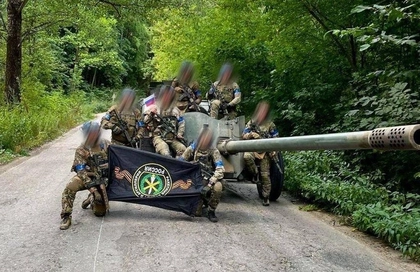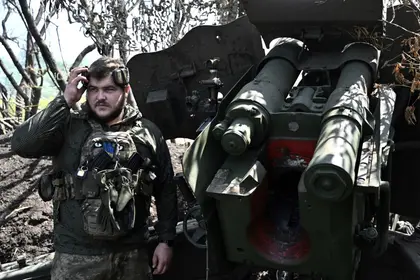Overview
- Ukraine says it breached Russian defense line near Bakhmut
- Further Ukrainian gains in south
- Russian soldiers blowing up comrades for cash, partisans claim
- Russia’s tank situation is bad and it’s only going to get worse – new research
- Ukrainian effort in Bakhmut have kept Russians from building forces elsewhere
Ukraine says it breached Russian defense line near Bakhmut
JOIN US ON TELEGRAM
Follow our coverage of the war on the @Kyivpost_official.
Ukraine announced on Monday afternoon that it has breached Russian defensive lines near Bakhmut.
In a post on Telegram, ground forces commander Oleksandr Syrskyi, said: “After losing the settlements of Andriivka and Klishchiivka last week, the enemy is conducting numerous counterattacks from different directions, unsuccessfully trying to regain lost positions.
“After all, these small, at first glance, settlements were important elements of the enemy's defensive line, which stretched from Bakhmut to Horlivka.
“As a result of the successful actions of our troops, the enemy's defense line was breached, which he tried to close, throwing all available reserves into battle.”
Further Ukrainian gains in south
Earlier on Monday its forces had recaptured small clutches of land from Russian forces along the southern front and near Bakhmut, AFP reports.
“Two square kilometres (0.77 square miles) were liberated in the Bakhmut sector," outgoing Deputy Defence Minister Hanna Maliar said on state media.
Her announcement came one day after Kyiv said its forces had retaken Klishchiivka, a village south of Bakhmut, which was captured by Russian forces in May after one of the longest and bloodiest battles of the war.
Maliar also said Ukrainian forces had clawed back 5.2 square kilometres in the south, where its forces are working to push deeper at two points along the front.

Ukraine’s Elite Special Ops: Top Missions of 2024 – From Black Sea to Kursk
⚡️ "As a result of successful actions of the Armed Forces of Ukraine, the enemy’s defense line near Bakhmut was broken" - Commander of the Ground Forces of the Armed Forces of Ukraine Oleksandr Syrskyi.
— BLYSKAVKA (@blyskavka_ua) September 18, 2023
“One of the most trained and best units of the enemy - the 72nd separate… pic.twitter.com/BqLwEl5ONR
Russian soldiers blowing up comrades for cash, partisans claim
Russian troops recruited into the ranks of Ukrainian partisan units are killing their own soldiers in sabotage operations in exchange for cash or the opportunity to live abroad, the partisans claimed.
In the latest incident, a Russian soldier allegedly placed 10 kilograms of explosives between two trucks at a military base in the occupied city of Henichesk, in Kherson region at the border with the Crimean Peninsula.
According to ATESH, the partisan movement of Ukrainians and Crimean Tatars, they orchestrated the operation in which an improvised explosive device was detonated as troops boarded the vehicles.
“Result: two trucks with personnel were destroyed,” the group said in a post on Telegram.
You can read the full story here.
Ukrainian forces retake Klishchiivka after success in Andriivka
The commander of Ukraine’s ground forces, Oleksandr Syrsky, said on social media on Sunday that the strategically critical town of Klishchiivka was “cleared of Russian forces,” AFP reported.
The battle for the frontline town on the southwest outskirts of Bakhmut has been raging for many weeks, with Ukrainian Armed Forces (AFU) and Russian forces trading advances and retreats. Ukrainian forces had chalked up another huge success on Friday by retaking the town of Andriivka, AFU officials announced, a claim that the Kremlin is disputing.
President Volodymyr Zelensky confirmed the victory in Klishchiivka and offered his congratulations in his nightly address on Sunday. “Well done!” he said.
Zelensky stressed in his speech that improved air defenses of Kyiv and the country at large are a “priority” going forward.
Russia’s tank situation is bad and it’s only going to get worse – new research
A recent French in-depth survey of Russian Federation tank production and losses has concluded the level of losses is such that it will be unable to conduct major armored operations for years to come, and that its army could effectively run out of tanks in Ukraine in 2025.
The Marseilles-based “Institut Action Resilience (IAR)” used satellite images, published Russian sources, battlefield data, and research into Russian commercial archives to develop a detailed estimate it made public on Aug. 31.
IAR’s conclusion is that Russian tank reserves are dramatically lower than the Kremlin would have outsiders believe. It contends that a realistic evaluation of Moscow’s tank stockpiles and its lack of industrial capacity to replace battlefield losses has resulted in a widening and impossible-to-close gap, the report found.
You can read the full story here.
ISW says that Bakhmut-area pressure has kept Russians from regrouping further south
According to the Institute for the Study of War (ISW), the constant pressure from the AFU in battlegrounds south of Bakhmut, resulting in the recapture of Klishchiivka and other key positions including Andriivka, has strained Russian forces enough to keep them from building offensives in their objectives further south.
“Elements of two of Russia’s four Airborne (VDV) divisions and three of Russia’s four VDV separate brigades are currently defending the Bakhmut area. This significant Ukrainian achievement has helped prevent Russia from creating a large mobile VDV operational reserve that could have been used to stop the main Ukrainian counteroffensive effort in the Zaporizhzhia [region],” the ISW wrote on Sunday.
The withdrawal of Wagner troops from the invasion earlier this year necessitated Russian reinforcements in the area, ISW added, contributing to the lack of Russian forces needed elsewhere. Indeed, the only Russian airborne brigade not dedicated to the Bakhmut-area fronts over recent months remains the 45th Guards Spetsnaz Brigade, a unit controlled directly by the Kremlin.
You can also highlight the text and press Ctrl + Enter






